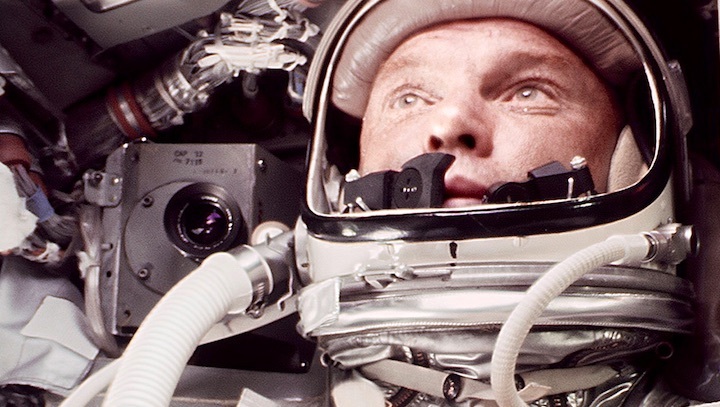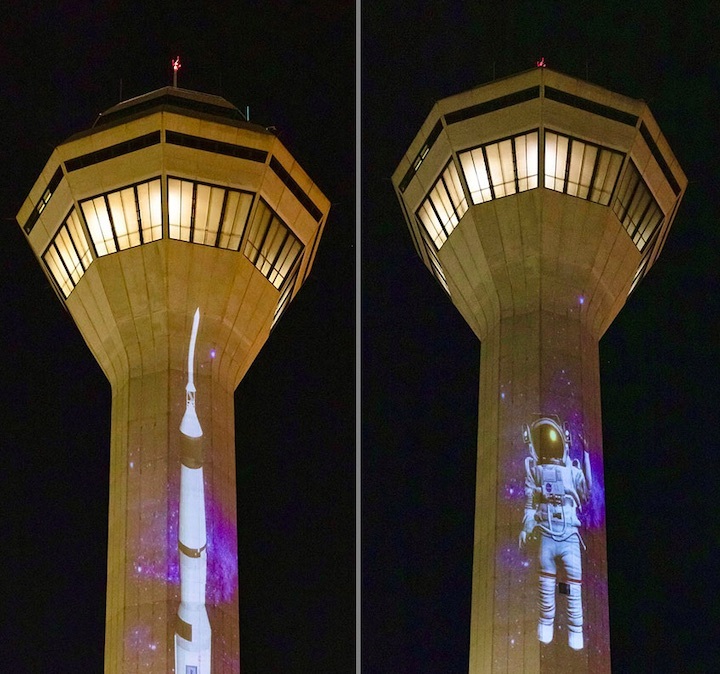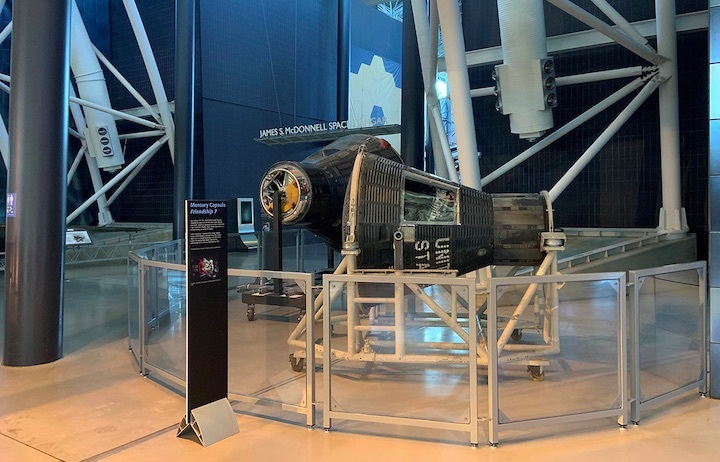21.02.2022

John Glenn in Earth orbit, as never seen before. Newly remastered imagery for the 60th anniversary utilized more than 1,000 image samples to reveal details on Glenn's spacesuit and reflected in his chest-mounted mirror. (NASA/Andy Saunders [digital source credit: Stephen Slater])
The latest U.S. astronauts to follow John Glenn into orbit and the Australian city that lit up for his mission 60 years ago both celebrated the legacy of Glenn's historic American spaceflight.
The four NASA crew members currently on board the International Space Station marked the anniversary in a video while the airport in Perth, Australia converted its control tower into a giant screen for a space exploration history-themed projection.
"Sixty years ago on Feb., 20 1962, one of the original Mercury astronauts, John Glenn, blazed a trail into the history books by launching on the Mercury-Atlas 6 mission aboard his Friendship 7 capsule to become the first American to orbit Earth," said Expedition 66 flight engineer Mark Vande Hei, joining his crewmates Kayla Barron, Raja Chari and Tom Marshburn for the tribute.
"Glenn's mission spanned just three orbits of the Earth in less than five hours, but accomplished three critical goals: to place a piloted spacecraft into orbital flight around the Earth, to observe human performance in such conditions and recover the human and the spacecraft safely back to Earth," added Chari in the recorded video, which was shared by NASA on social media on Friday (Feb. 18).
'City of Lights' lit up again
During his Mercury flight, Glenn, who died in 2016 at the age of 95, took particular note of one city's lights as he flew over Western Australia.
"Just to my right I can see a big pattern of lights apparently right on the coast. I can see the outline of a town and a very bright light just to the south of it," radioed Glenn just under an hour into the mission.
"Perth and Rockingham, you're seeing there," replied Mission Control.
Knowing that Glenn would fly over, the residents of Perth switched on every light in the city to be sure they could be spotted. It worked, earning Perth the nickname "City of Lights."
"The lights show up very well and thank everybody for turning them on, will you?" said Glenn from orbit.
Sixty years later, it was Perth Airport saying thank you to the late Glenn by putting on its own light show.
"It's great to be involved in the 60th anniversary, and to mark the occasion by lighting up the control tower is something pretty unique," said Kevin Brown, Perth Airport's chief executive officer, in a statement.
Working with local artists VJZoo to create the projection, the airport's control tower became a giant movie screen on the eve of the anniversary, covering almost 130 feet (40 meters) of the 260-foot (80-meter) tower. The two-minute animation, which ran on a continual loop for two and a half hours featured a Saturn V rocket blasting off into space and an astronaut "space walking" up the tower.
"We know that John Glenn didn't get out of Friendship 7 ... but we thought it would add some fun into the display," said Brown.
From hours to decades
While he did not go extravehicular, Glenn's first flight into orbit paved the way for Americans to spend increasingly longer amounts of time circling Earth. For more than 20 years, humans have had a continuous presence in orbit living aboard the International Space Station.
"The flights of [NASA astronauts] Alan Shepard and Gus Grissom on suborbital missions in 1961 proved the launch capability, but questions remained as to whether the human body could withstand longer periods of weightlessness. John Glenn's pioneering mission erased those doubts," said Marshburn, who at 61 is the only NASA astronaut currently in orbit who was alive for Glenn's mission.
The crew members also used their video to recognize Black History Month and its overlap with the date of Glenn's first mission. Once a "hidden figure," an African-American mathematician played a key role in the lead-up to the Mercury-Atlas 6 launch.
"The Friendship 7 mission highlights another giant in NASA's history, Katherine Johnson. Due to the complexity of the flight and his weariness of leaving intricate mathematical equations up to machines, Glenn personally asked Johnson to run the orbital trajectory calculations for Friendship 7," said Barron.
"All of us aboard the International Space Station want to honor John Glenn today for his remarkable achievements," said Vande Hei, who will set his own record in March, becoming the American with the single longest spaceflight at 355 days. "Because of him, we are heading back to the moon and on to Mars and beyond."

Views of the control tower at Perth Airport in Australia lit for the first time in celebration of the 60th anniversary of John Glenn's Mercury mission and his flight over the City of Lights in 1962. (Perth Airport)

John Glenn's Mercury capsule, Friendship 7, on special display for the 60th anniversary of his history-making mission at the National Air and Space Museum's Steven F. Udvar-Hazy Center in northern Virginia. (Smithsonian)
Quelle: CS
